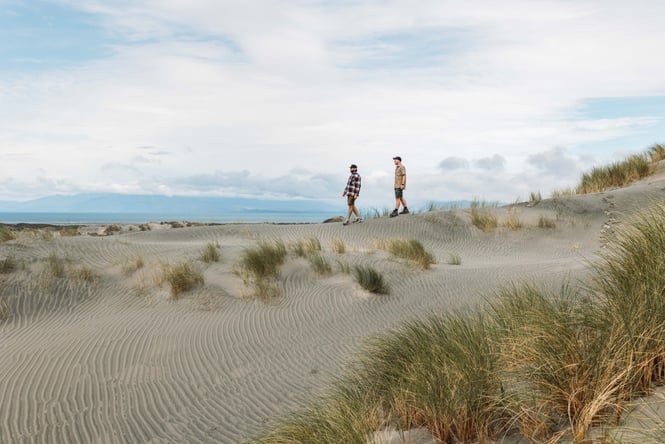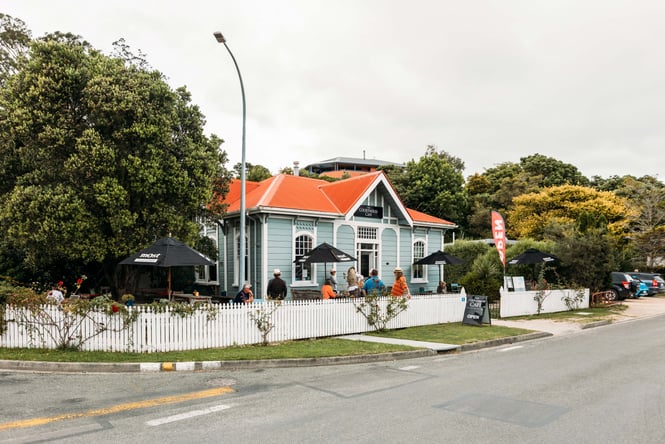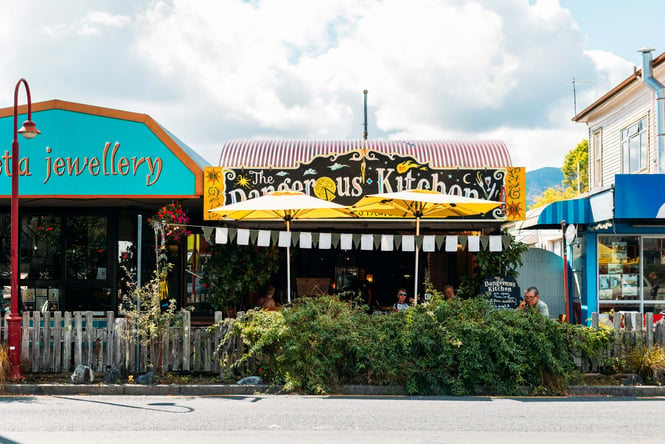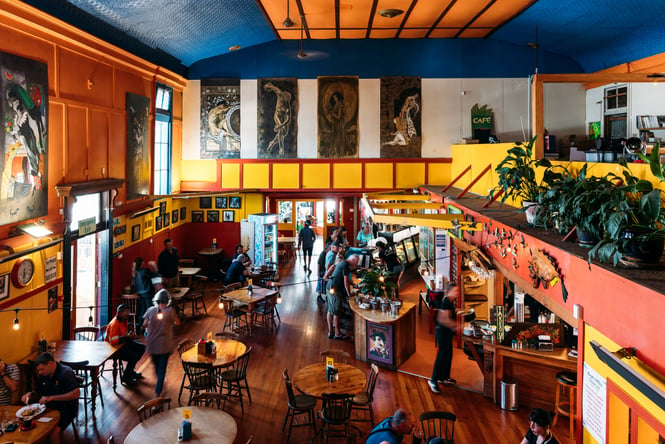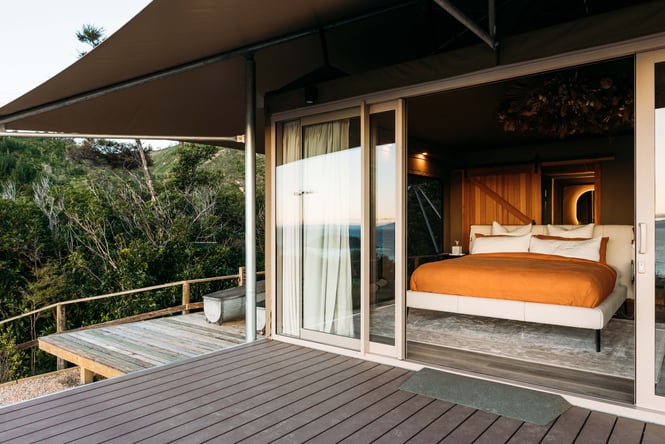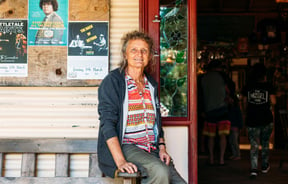An Eco-Tourism Guide To Golden Bay
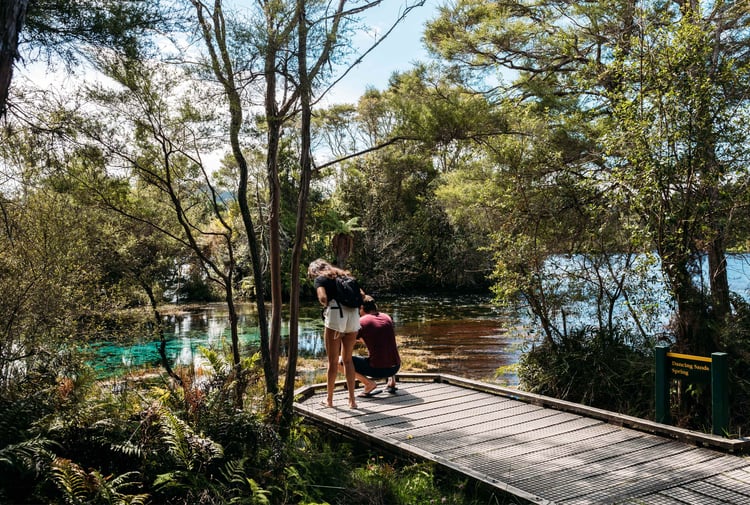
For many travellers, it’s important to know that their holiday doesn’t have a negative environmental impact. After all, as so many popular tourist destinations in Aotearoa New Zealand are renowned for their beauty, it’s important to ensure they’re preserved for the next generation.
In Nelson Tasman, Golden Bay is an eco-conscious tourist’s dream. Not only does it have unspoilt natural wonders galore, but many of the restaurants, shops and services in the area are also already set up with eco-tourism in mind. Read on for our ultimate guide to a sustainable trip to Golden Bay.
Words by: Claire Williamson
Photos by: Anna Briggs & Getty
Visit Farewell Spit
Farewell Spit Tours
6 Tasman Street, Collingwood
Given the Spit’s significance, it’s unsurprisingly afforded some of New Zealand’s highest levels of protection. One of the best – and safest for the environment – ways to visit is to book a tour through a reputable company such as Farewell Spit Tours, which ensures you only visit areas of this protected habitat that can accommodate human visitors.
Their 6.5-hour signature Farewell Spit Tour gives a full sense of the splendour of the Spit. You’ll climb one of the larger sand dunes for a panoramic view around the Bay and stop off at the historic steel lighthouse near the Spit's tip. If you don’t have a full day to spare, the shorter, 2-hour Wader Watch Bird Tour will give you a taste of the Spit’s ecology, with birdwatching near the base of the Spit at high tide.
The Courthouse Café
11 Elizabeth Street, Collingwood
Farewell Spit Tours helps keep the area predator-free by working with the Department of Conservation to trap stoats, rats and possums; organise and provide transportation for annual clean-ups; and ensure tours avoid fragile areas of the Spit to protect the environment and wildlife that call it home. From the tour operator’s main base in Collingwood, you can also pop into The Courthouse Café, which – as the name suggests – is housed in the town’s historic courthouse building. Beyond offering locally sourced (and delicious) kai, the café doesn’t offer disposable takeaway cups, so if you want a cuppa before your tour starts, plan to bring your own. Or you can pay a $4 deposit for a small stainless steel cup, which is refundable if you bring it back for reuse.
Gaze at clear spring waters
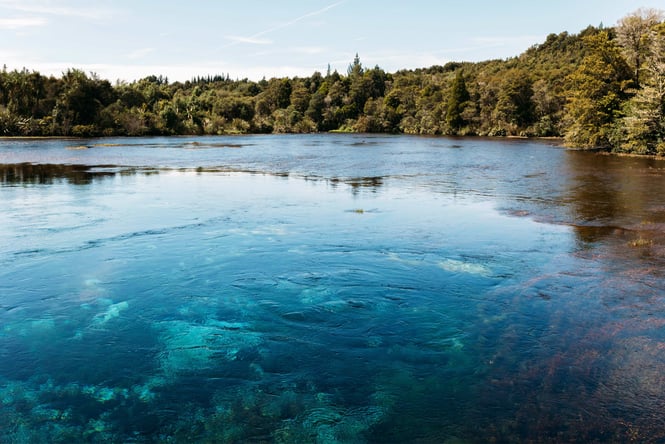
Te Waikoropupū Springs
Another “-est” in New Zealand, Te Waikoropupū Springs is (according to the Department of Conservation) “the largest freshwater springs in New Zealand, the largest cold water springs in the Southern Hemisphere and contain some of the clearest water ever measured.”
The gentle, one-way boardwalk loop track takes you through the bush to the edge of the springs. Although you can no longer touch this natural taonga, the view through the crystal-clear waters is incredible. As you gaze into the springs, keep an eye out for the current of bubbles moving with force through underwater vents, which cause the springs’ notable “dancing sands” effect. Don’t skip the carved pouwhenua and information panels at the start of the walk, which details the springs’ historical and spiritual significance.
Shop secondhand
Saturday Village Market Tākaka
No weekend adventure to Golden Bay is complete without a leisurely perusal of the Saturday Village Market Tākaka. Running weekly in summer and monthly in winter, the open-air market takes over the local library parking lot and features stalls selling local food and produce, artisan crafts such as glassware or leather, artwork, vintage secondhand finds and more, as well as performances by local musical acts. It’s a great opportunity to meet and mingle with other tourists and friendly locals alike.
Plan to fill up on pastries from Bacca Bakery, who drive into town from Parapara to sell their wholemeal breads and sourdough treats, then amble through the stalls and see what catches your eye. Some stalls offer EFTPOS, but having cash on hand is good.
Pop into Abel Tasman National Park
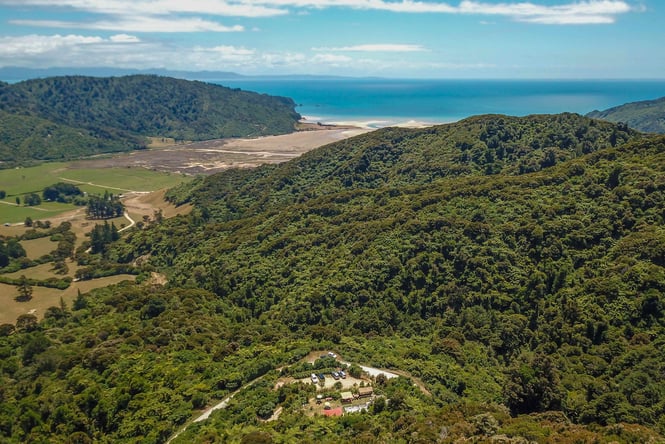
Totos Café & Pizzeria
Drive up the coast to enter the trails from Wainui Bay, or head inland toward Awaroa – past Totos Café & Pizzeria, which is well worth a pitstop for a pizza, some beer, and to take in the view if it’s open – to access trails from there.
You can make your time in the national park as long or short as you like. For those who only want a taste, from the Pidgeon Saddle signpost, there’s a fairly easy 700-metre trek through the bush that, once you emerge into a cow pasture, has lovely views of the bay beyond.
Photo by: Supplied
Eat Your Way Around Golden Bay
The Dangerous Kitchen
46 Commercial Street, Tākaka
The Dangerous Kitchen’s menu uses 99% locally grown produce for their cabinet items and pizza toppings and the eggs are all free-range. As much as possible, they make everything in-house, including the pizza bases, pesto, hummus, sauces and more.
Dancing Sands Distillery
Since April 2023, Dancing Sands Distillery, which is tucked just off Tākaka’s main Commercial Street, has pivoted from using imported European bottles to selling their range of gin in 100% New Zealand recycled glass, eliminating 15,000 kilograms of carbon emissions every year from their production cycle. It’s the same innovative, nature-inspired flavours, but now with more traceability.
The Wholemeal Café
7110/60 Commercial Street, Tākaka
The Wholemeal Café also uses local, organic ingredients for the dishes on their expansive menu. With options such as “vegetarian,” “vegan” or “dairy free” clearly listed, it’s easy to make plant-based choices.
De-Lish Delicatessen
Part specialty grocery store, part delightful eatery, De-Lish Delicatessen opens before 7am on weekdays for the crazy early birds amongst us. There, you can peruse their range of local cheese, seasonal produce and other fine pantry staples. You can even get refills of bulk items like olive oil, saving you from buying another plastic container from the supermarket. And don’t skip over the range of sweets and savouries, plus a strong flat white to perk you right up!
Where to Stay
Fancy Tents - Drift Off Grid Glamping
1322 Abel Tasman Drive, Tata Beach
One of the best draws of Golden Bay is the gorgeous scenery, and at Drift Off Grid Glamping, you can immerse yourself in nature while staying at stylish, eco-conscious accommodation.
Situated on an ex-forestry block being lovingly replanted in natives, Drift Off Grid’s two tents—Kanuka and Korimako—come with a super king bed, double shower, log fire and heated floors, plus vintage soaking baths imported from Europe.
This comfort doesn’t sacrifice the sustainable ethos, either. The tents are fully off-grid, powered with solar energy and a back-up generator for rainy days. Five-metre double-glazed sliding doors ensure they’re kept toasty in the winter while still preserving the view, and mesh on the windows means when temperatures rise, the ocean breeze keeps you cool. As well, special Eco Anchor foundations keep the tents’ impact on the land minimal. Bookings also come with access to an electric buggy, perfect for making quick trips to Tata Beach or into Pōhara.
Accountable Luxury: Adrift in Golden Bay
If staying within four firm walls is more your speed, another eco-conscious accommodation option is Adrift in Golden Bay. Their five self-contained villas—several within spitting distance of the beach, the others nestled within well-tended gardens—are elegant, fully furnished spaces perfect for a cosy getaway for two.
And their list of sustainability initiatives is impressive, including using solar panels and wood to heat water for baths and showers, stocking the villas with local or refillable toiletries, gradually replanting their 11-acre block in natives, energy-efficient appliances, and even supporting kororā (little blue penguin) nesting and conservation.
